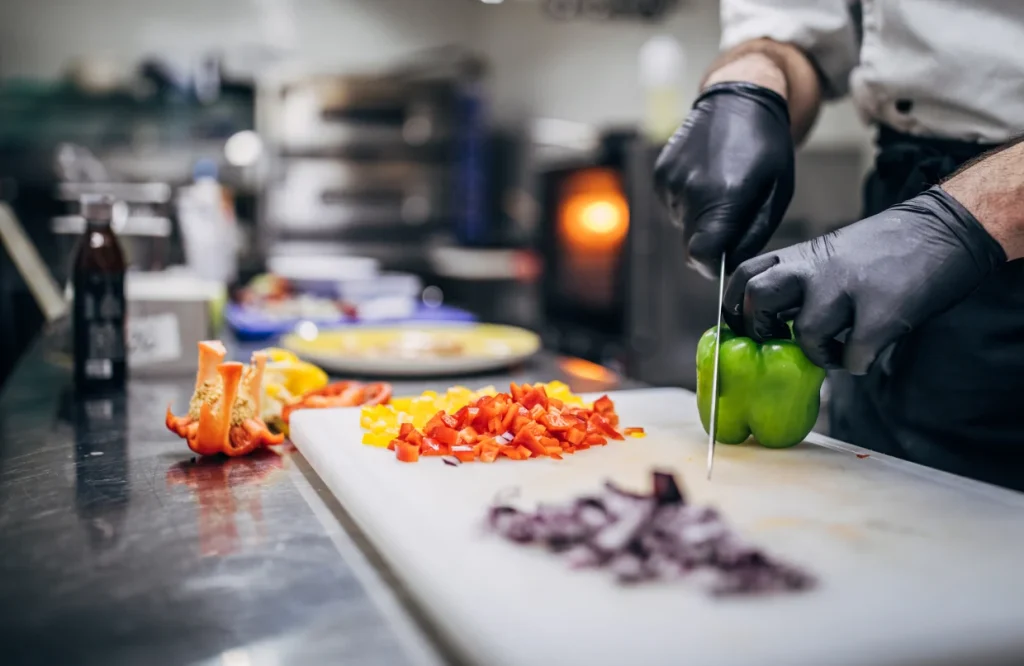According to a report released by the Centers for Disease Control and Prevention (CDC) on Tuesday, a significant proportion of foodborne illnesses at eateries and other food-serving establishments are spread by ill employees.
From 2017 to 2019, about 40% of foodborne disease outbreaks with identified causes were linked, at least in part, to food being contaminated by a sick or infected worker, the report revealed. For example, in 2017, Chipotle traced a norovirus outbreak in its Sterling, Virginia, restaurant back to an employee who had reported to work while unwell.
The report indicated that norovirus, a gastrointestinal virus causing symptoms like vomiting and diarrhea, was the most prevalent pathogen involved in foodborne illness outbreaks at U.S. restaurants during the studied period. It accounted for 47% of the 800 outbreaks identified by the CDC. Salmonella, a bacteria that leads to diarrhea, fever, and abdominal cramps, accounted for nearly 19%.
The CDC report advised restaurants to devise and implement policies that mandate sick employees to inform their manager about their health status and to refrain from coming to work if they’re unwell. While most restaurants have some guidelines concerning sick workers, the report discovered that these policies are frequently incomplete.
In a statement to NBC News, the CDC noted, “Our data indicate that many restaurants do not have comprehensive sick worker policies that could help them prevent outbreaks from sick workers.”
Approximately 92% of the managers interviewed by the CDC stated that their establishment had a policy obliging food workers to report any symptoms if they feel sick. However, only 66% reported having those policies in writing, and merely 23% said their restaurant’s policy listed all five symptoms suggested by the Food and Drug Administration as grounds for notifying a manager: vomiting, diarrhea, jaundice, fever with a sore throat, or a lesion with pus.
Moreover, while over 85% of surveyed managers said their establishment had a policy that forbade ill employees from working, only 62% of managers stated the policy was written and 18% said their policy included all five symptoms recommended by the FDA.
Darin Detwiler, a food regulatory policy professor at Northeastern University who wasn’t involved in the research, stressed that it’s not just about a sick employee, but also about managers and other supervisors who neglect to follow health department guidelines.
Detwiler suggested that better paid sick leave policies, whether mandated by the state or implemented by individual companies, would facilitate curbing outbreaks. Some past research supports this claim: a 2021 study found that Olive Garden’s decision to extend paid sick leave coverage during the pandemic decreased the rate of front-line food service employees working while sick.
Nonetheless, the CDC report discovered that less than half of the food establishments with outbreaks offered paid sick leave to at least one food worker. Fourteen states and Washington, D.C. currently have paid sick leave laws, according to the Center for American Progress, a progressive think tank.
Detwiler argued, “If companies value their employees’ health and their customers’ health, then they would not be responding reactively to these things. They would be taking proactive steps to prevent these things from happening.”
In addition to paid sick leave, the CDC suggested that restaurants could also benefit from a staffing plan that includes on-call workers. The agency noted that there are numerous reasons for workers reporting to work when ill, ranging from financial to social reasons like not wanting to let their coworkers down.
Each year, foodborne diseases in the U.S. are responsible for around 48 million illnesses and 3,000 deaths. According to Detwiler, most of these deaths could be preventable.
